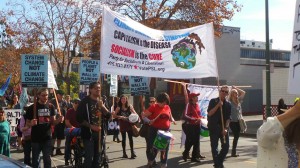As humanity teeters on the brink of irreversible climate change, world leaders joined the COP21 UN Climate Change Conference in Paris in December 2015. But are international conferences like these really capable of resolving the issue?
The two-week long conference hosted 40,000 delegates from 195 countries and assessed global progress and set new goals. The conference was scheduled to end today, but was extended through Saturday in hopes of coming to an agreement on a binding deal. The developing world, rightfully so, is demanding more financial support from the developed nations for advancement of infrastructure and recovery from droughts and extreme weather events.
2015 was the hottest year on record as we recently reached the threshold of 1 degree C of warming since the industrial era began.
Scientists warn that in order to not exceed 2 degrees C warming, which is predicted to be catastrophic for life on Earth, we must leave more than 80 percent of known fossil fuel reserves in the ground. The commitments of COP21 aim to keep warming under this threshold with some pushing for a more conservative 1.5 degree warming limit. But as with the Kyoto Protocol, there will not be any sanctions or similar punishment if a country falls short of its pledge.
The global people’s movement is demanding that leaders take immediate meaningful action.
These worldwide protests have taken up slogans such as “System Change, Not Climate Change” and “There is no Planet B.”
All scientific evidence supports that climate change is here, it is caused by human behavior and if we don’t take measures immediately to drastically curb greenhouse house gas emissions or GHGs, we will face catastrophic climate change.
Currently, entire ecosystems are being thrown off balance by the warming climate, extreme weather and sea level rise as we face the 6th mass extinction, the worst disaster since the dinosaurs died off. Each species serves a role in the greater ecosystem. Like parts in a factory, when one part breaks, the factory can no longer produce. And what factory Earth produces is life sustaining air, water and food.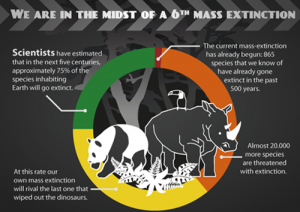
Biodiversity
A mass extinction has repercussions for all living things because of its effect on the capacity of the earth to produce what we need to survive. It’s not just that we want to save the polar bears because we think they’re cute and we enjoy having them around. Biodiversity is crucial for our survival.
What does a warming atmosphere really mean? Do we all just have to move inland, adapt to the heat and be more creative at growing food? It’s actually much more daunting. If we were to reach 6 degrees warming, which is possible with the business-as-usual scenario, a major imbalance would occur in the atmosphere and it would be like trying to breathe on Mount Everest but at sea level.
Tipping points refers to the fact that there will not be enough oxygen in the atmosphere to sustain life. With current predictions of warming, humanity will have to adapt to the changes already in motion, but we cannot adapt in this runaway scenario.
U.S. Non-Compliance
It is important to put in perspective the commitments of the U.S. to cut emissions. For one, the U.S. has by far the largest per-capita carbon footprint globally, almost 3 times greater than China’s. And also because we live in the belly of the beast, and we are the ones who can most readily make change here.
Does the Obama administration really care about climate change? Obama flew in for the first day of the climate conference, made a speech, posed for photos ops and went home.
He pushed for vague solutions of “a single transparency mechanism that all countries are adhering to” and said those mechanisms must be “legally binding.” This contradicts what Sec of State John Kerry said a few weeks before stating that the US would not sign any binding agreement coming from COP21. Also, the US Congress must approve any legally binding pact and Obama is well aware that such an agreement will likely never pass.
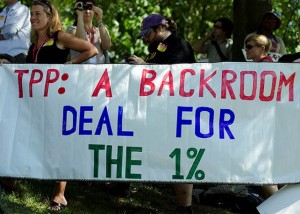 Also in contradiction to a meaningful commitment from the US, is the Trans-Pacific Partnership trade agreement (or TPP), which the Obama administration is trying to push through the approval process. The TPP agreement, known by critics as NAFTA on steroids, will supersede any agreement that comes out of Paris, putting the rights of corporate profits before countries’ environmental regulations or sustainable development plans.
Also in contradiction to a meaningful commitment from the US, is the Trans-Pacific Partnership trade agreement (or TPP), which the Obama administration is trying to push through the approval process. The TPP agreement, known by critics as NAFTA on steroids, will supersede any agreement that comes out of Paris, putting the rights of corporate profits before countries’ environmental regulations or sustainable development plans.
Jason Kowalski, policy director of 350.org stated, “The TPP is an act of climate denial. While the text is full of handouts to the fossil fuel industry, it doesn’t mention the words climate change once.” It gives “fossil fuel companies the extraordinary ability to sue local governments that try and keep fossil fuels in the ground … If a province puts a moratorium on fracking, corporations can sue; if a community tries to stop a coal mine, corporations can overrule them. In short, these rules undermine countries’ ability to do what scientists say is the single most important thing we can do to combat the climate crisis: keep fossil fuels in the ground.”
Under the free trade agreements of the 1990s, emissions from shipping increased by 400% due to outsourcing production from the developed world and the unnecessary back-and-forth movement of materials and goods in order for corporations to exploit cheap labor markets.
The “free trade” model, along with capitalism itself, is at its core irreconcilable with the path to a sustainable world.
Also never seriously addressed at climate conferences, is the fact that the Pentagon, which is the biggest polluter on the planet, is immune to any regulatory authority and not beholden to any environmental agreements.
 During the Kyoto negotiations in 1997, the US demanded as a provision that all of its military operations worldwide, including operations with the UN and NATO, be exempted from measurement or reductions. The US then refused to sign the agreement but the US Congress went on to pass an explicit provision guaranteeing the US military exemption from any energy reduction or measurement.
During the Kyoto negotiations in 1997, the US demanded as a provision that all of its military operations worldwide, including operations with the UN and NATO, be exempted from measurement or reductions. The US then refused to sign the agreement but the US Congress went on to pass an explicit provision guaranteeing the US military exemption from any energy reduction or measurement.
Corporations the Problem, not the Solution
It’s not just the US who has a blatant disregard for the gravity of the situation but global capitalism itself. Many of the very sponsors of COP21 are big polluters, such as car companies like Renault/Nissan, Air France who opposes emission reductions in aviation, and Suez Environment, a pro-fracking company, and the list goes on.
Thinking that we can solve the issue of climate change under the same leadership that caused the crisis is ludicrous. It is like having landlords and big developers in San Francisco sponsor a plan to solve the crisis of homelessness. By nature, there is a conflict of interest.
Regulatory agencies are weak in the face of Big Oil, gas and coal with their fleets of lawyers and lobbyists that all the environmental groups combined can never match. The truly undemocratic nature and inefficiency of capitalism becomes ever more apparent in California’s drought crisis.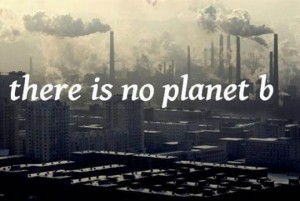
As the state attempts to create a law regulating ground water use, agribusiness is fighting back. As usual under capitalism, the long term protections of the environment and the needs of society as a whole are sacrificed for the profits of a few.
Instead of focusing on solutions, the state is concerned, and understandably so, with the tidal wave of lawsuits that are sure to come from the agricultural sector if any binding legislation is passed. When King County Supervisor Doug Verboon suggested restrictions on new water well drilling, he was answered by a local farmer with, “Can you afford a bodyguard?”
Resistance
This is the insanity of the right to “private property” that puts the rights of individual land owners over the needs of the entire community, and in the long run, the very survival of our species. These contradicting interests can never be reconciled under the capitalist model as its very foundations are built on dog-eat-dog competition instead of cooperation. And cooperation is our only hope.
At the opening of COP21, President Evo Morales of Bolivia brought proposals from social movements that came out of the October People’s Climate Summit held in Cochabamba. “We ask for an end to the irreversible destruction of the planet and remember that capitalism has developed an overwhelming and destructive life force, caused by the production of consumer goods that today destroy nature, with wars of conquest,” said Morales.
While President Rafael Correa of Ecuador said “Someone in a rich country emits 38 times more CO2 than someone from a poor country … Conservation in poor countries isn’t possible if quality of life there isn’t improved.” Meaning it is the responsibility of the “first world” to not only curb consumption and adopt sustainable practices, but to share technology and resources with the developing world which it has exploited for its own enrichment for centuries.
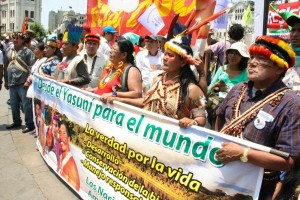 Correa also called for the creation of an International Court of Environmental Justice, which would punish environmental crimes and enforce payment of environmental debts. This is important in light of the global power dynamics, where the US consistently ignores all international laws in regards to national sovereignty with its wars and interventions and would certainly not abide by any binding climate agreement if it were to actually sign one.
Correa also called for the creation of an International Court of Environmental Justice, which would punish environmental crimes and enforce payment of environmental debts. This is important in light of the global power dynamics, where the US consistently ignores all international laws in regards to national sovereignty with its wars and interventions and would certainly not abide by any binding climate agreement if it were to actually sign one.
Capitalism Kills
The reality that the West must face is that our species cannot survive with our rate of consumption of resources. The overproduction of goods and level of carbon output under capitalism is not sustainable.
This does not mean we all have to go back to living in caves, but corporations cannot be allowed to continue the rapid rate of production of disposable goods and the absurd practice of planned obsolescence. 30% of food produced in the US is thrown away because it can’t be sold at a profit.
Currently, if all of humanity lived like the average U.S. consumer, we would need over 5 Earth’s to sustain us. Not only do we need to curb consumption, but we need massive infrastructure improvements to greatly decrease how many cars are on the road by using smart growth planning so that people live, work and shop within their communities in addition to a massive expansion of public transit.
The scientists and engineers of the world have the solutions. The technology exists today to provide all energy needs globally using wind, water and solar, but the political will to quit fossil fuels is largely absent.
We cannot solve this crisis through the corporate model and the capitalist system that relies on the whim of the market to determine what is produced and in what quantity; where corporations compete for cutting edge technologies, undermine each other’s research and patent new discoveries as private property to be profited from. It’s completely inefficient and a waste of knowledge and resources.
We cannot wait for the corporations—that in reality hold power over the government—to give up their massive profits from fossil fuels and over production, to decide that the planet and people are more important.
Cuba: Socialism in Action
In socialist Cuba, there is cooperation and a pooling of knowledge and resources within all sectors of society and with the outside world. Their grassroots participatory democracy along with centralized planning and distribution of resources is an efficient means to address the needs of society.
Through this model, Cuba has repeatedly been the only nation to achieve sustainable development despite the 53-year-long devastating economic blockade imposed by the U.S. that severely restricts Cuba’s ability to trade. Sustainable development is determined by ecological footprint combined with a country’s Human Development Index (HDI) which rates nations on life expectancy, literacy and education.
Some claim it’s because of a lack of resources that Cuba is the only sustainable country, but it is actually because they put the highest priority on human development, such as education and health, and use their resources for the well-being of society in the long term. This is true sustainability.
In 2006, the government implemented the Year of Energy Revolution and distributed ten million energy efficient light bulbs and over 6 million rice cookers and pressure cookers free of charge to the population along with other energy efficient appliances. Under capitalism, this would not be possible, and the corporations would likely sue the government for inhibiting their profits.
 Cuba also puts great effort into protecting their environment and has the largest and best preserved wetland area in the Caribbean and reforestation programs and reclamation of discarded industrial areas in Havana.
Cuba also puts great effort into protecting their environment and has the largest and best preserved wetland area in the Caribbean and reforestation programs and reclamation of discarded industrial areas in Havana.
Cuba has also implemented extensive polyculture organic agriculture and urban gardens which allows for the elimination of emissions from transport of food from rural to urban centers. Organic urban farms along with 60,000 urban patios, provide 75% of Havana’s consumption needs of produce.Polyculture organic practices also help preserve the soil nutrients and retain more moisture.
Faced with increasing hurricanes and droughts as a result of climate change, Cuba is planting more drought resistant crops such as yucca and plantain and low growing plants such as squash, malanga and sweet potatoes, which stay anchored in high winds. Unlike in California where water intensive crops continue to be grown in the midst of the drought solely because of the high profits they yield.
Cuba’s National Institute of Tropical Food Research has developed a gene reservoir with hundreds of varieties of different crops which can be cross bred to adapt to climatic changes.
 Unlike capitalist solutions like Monsanto’s drought resistant GMO seeds—a risk to human health and the ecosystem—Cuba uses natural, sustainable methods and new seed varieties are provided to all farmers instead of sold on the market to those who can afford it with data kept secret by patent rights.
Unlike capitalist solutions like Monsanto’s drought resistant GMO seeds—a risk to human health and the ecosystem—Cuba uses natural, sustainable methods and new seed varieties are provided to all farmers instead of sold on the market to those who can afford it with data kept secret by patent rights.
Cuba is a living model for how sustainability can be achieved. If world leaders were serious about taking action on climate change, they would be studying the Cuban system and adopting it.
Many of the seemingly insurmountable environmental crises we face can be solved under a socialist system, where the rights to private property and profit are eliminated and society can pool knowledge and resources to meet the needs of all.
Our hope cannot lie in the politicians to save us. Our hope lies in the global people’s movement. We need a new system, a socialist system—that works in the interests of humanity and the planet—not for a few billionaires. And we need to continue building and strengthening the mass movement to make that change. Join us.
